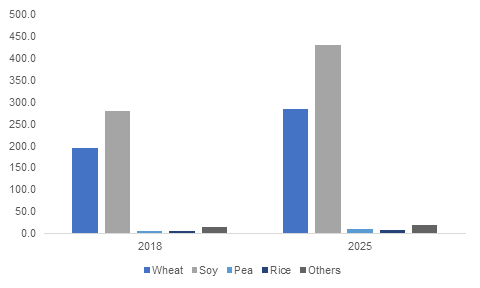Growing adoption of veganism is driving market growth: In the U.K., 16% of new product launches claimed vegan or no animal content in 2018. The sports nutrition market is driving demand, too; soy proteins have the proper balance of nine essential amino acids, making them a desirable ingredient.
Regulatory approvals from FDA regarding soy protein health claims along with the use of pea protein in functional food & beverages may fuel product demand, increasing plant protein incorporation into functional foods.
However, rising raw material costs due to weather conditions may challenge the industry’s profitability—but meat price increases and increasing risk of livestock disease will favor plant protein demand.
Related: Plant-Based Food Retail Sales Grew 11% This Past Year Rice Protein Market Growing Thanks to Trends Towards Plant-Based, Active Lifestyles Critical Merchandising Strategies to Grow Sales with Plant-Based Products
Pea protein, specifically, may exceed $185 million by 2025, thanks to the fact that it is generally hypoallergenic. The soy protein market size, in spite of the fact that it’s a common allergen, is likely to register gains over 6.5% by the end of 2025.The functional food & beverage market itself may surpass $2 billion through the end of 2025, thanks to consumer inclination towards health and pill fatigue. Bakery application may witness gains over 5% in the forecast period, thanks to growing demand for gluten-free items along with the general desire for functional foods.
Key industry participants include Cargill, Axiom Food, Kerry, and Prinova Group.
The full report can be purchasedhere.










